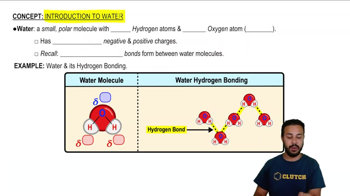Here are the essential concepts you must grasp in order to answer the question correctly.
Water Balance
Water balance refers to the equilibrium between the intake and output of water in the body. It is crucial for maintaining homeostasis, as it affects cellular function, blood pressure, and overall health. The body regulates water balance through various mechanisms, including thirst, hormonal control, and renal function.
Recommended video:
Fluid Intake and Output
Fluid intake includes all sources of water consumed, such as beverages and food, while fluid output encompasses water lost through urine, perspiration, and feces. Understanding these components is essential for assessing hydration status and ensuring that the body maintains adequate water levels for physiological processes.
Recommended video:
Regulatory Mechanisms
The body employs several regulatory mechanisms to maintain water balance, including hormonal signals like antidiuretic hormone (ADH) and aldosterone. These hormones influence kidney function, promoting water reabsorption or excretion based on the body's hydration needs. This regulation is vital for preventing dehydration or overhydration.
Recommended video:
 Elaine N. Marieb, Katja Hoehn 7th Edition
Elaine N. Marieb, Katja Hoehn 7th Edition Ch. 26 Fluid, Electrolyte, and Acid-Base Balance
Ch. 26 Fluid, Electrolyte, and Acid-Base Balance Problem 4
Problem 4 Verified step by step guidance
Verified step by step guidance


